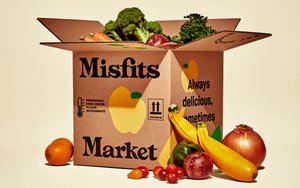
Misfits Market is
expanding, and hopes its take on online food delivery — with an emphasis on convenience, value and a little bit of mystery — will be enough to make a serious impact on food waste.
The company is building its brand on a familiar story, at least to the millions of consumers concerned about food waste. But as other companies have struggled to come up with an “ugly
produce” proposition that works, Holly Eagleson, who heads up marketing, says Misfits is winning by using social media and stunning photography. With its weird potatoes, naughty carrots and
misshapen parsnips from organic growers, “we’re building a modern brand that’s about both convenience and sustainability.”
The New York-based company launched in 2018,
selling customers on the beauty of imperfect produce: the kind that isn’t perfect enough to make it to the supermarket. Some of the defects are so slight they’re barely noticeable, says
Eagleson. Others are perfect, but find their way to Misfits through some supply-chain disruption —a bumper crop, for example, or order excess.
advertisement
advertisement
The Department of Agriculture estimates in
the journey from grower to retailer to consumer, between 30% to 40% of America’s food gets wasted each year.
But while the initial appeal of Misfits, along with competitors like
Imperfect Foods and Hungry Harvest, is a growing sense of horror about food waste, that’s not enough to keep consumers hooked on weekly subscriptions.
“Food is an emotional choice,
and we make it three times a day,” she tells D2C FYI.
So Misfits makes it friendly. “You get these cute little anthropomorphic ugly things that look like your favorite
celebrity or your crazy uncle, and you want to take care of them and do the best for them.”
And it makes it a little mysterious. While about 40% of customers can customize boxes, people
love the surprise of unboxing that week’s order, whether it contains kohlrabi, pomegranates or cauliflower.
“Home cooks like the surprise and delight of opening this mystery box of
fresh veggies and then getting challenged to work with them,” Eagleson says. Several Facebook groups have formed, with thousands of members sharing photos and recipes. “We also have to
educate customers about what to expect, because a lot of our produce looks surprisingly normal. That can disappoint people.”
Misfits maintains a strong social media presence,
“because [users] are interested in making the most of this produce, from root to tip. We give them ideas for carrot-top pesto to making veggie stock,” she says.
Value is also part
of the appeal. The company's small boxes include 10 to 12 pounds of fruits and veggies each week for about $20, while the larger contains 18 to 20 pounds for about $34. It says that’s roughly
half of what it would cost in a conventional grocery store.
Still, it’s a hard sell. A recent marketing study from the University of Pittsburgh even found that ugly produce negatively
impacts people’s self-esteem. And while many grocery chains have tried selling the ugly stuff, many have fizzled out, including Meijer, Hannaford and Giant Eagle. Whole Foods Market and Walmart
have also stepped away from tests.
Misfits, which raised $16.5 million last year, hopes to gain by focusing on consumers who are more committed to ending food waste, eating organic and
shifting to more plant-based meals. Eagleson says the company’s mission, which includes employing formerly incarcerated people, resonates with consumers trying to lessen their impact on the
earth.
It’s also expanding to include non-produce items, “as long as they fit our misfit criteria and are priced at a bargain.”
Marketing centers on social media, and
creating content that’s shareable and engaging. As Misfits expands, Eaglesons ays it’s doing an events tour through the South, “a region that long been underserved in a lack of
access to fresh organic produce.”